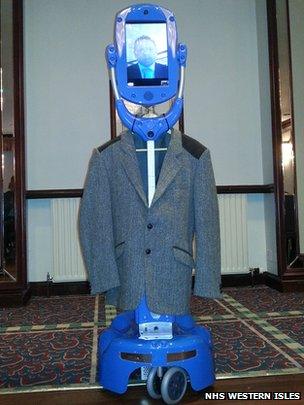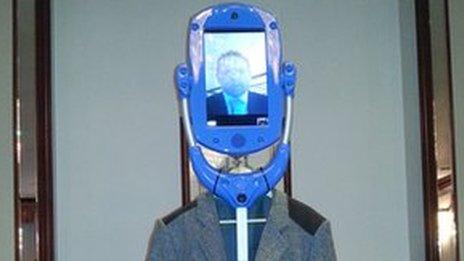Robots to help people with dementia in Western Isles
- Published

The robots will be used to connect people with their carers
NHS Western Isles is putting robots into the homes of people with dementia as part of a pilot scheme to help them to continue to live independently.
A relative or carer - potentially hundreds of miles away - can drive the machine around the house to check that everything is all right.
The pair can also have a chat through a two-way video call system.
The Giraff robots are 1.5m (4ft 11in) tall with wheels, and a TV screen instead of a head.
A relative or carer can call up the Giraff with a computer from any location. Their face will appear on the screen allowing them to chat to the other person.
The operator can also drive the robot around the house to check that medication is being taken and that food is being eaten.
NHS Western Isles will be piloting the Giraff for the first time in Scotland, as part of the European Union project Remodem, which aims to investigate ways to support people with dementia living in remote communities.
'High hopes'
Health board bosses said earlier trials in Australia showed that people with dementia were not afraid of the machines. They hope the robots will help people living alone in remote areas to feel less lonely.
Chief executive Gordon Jamieson said: "We are absolutely delighted to have the Giraff here with us to trial and we have high hopes for how it may improve the quality of life for some dementia patients.
"As a new technology for us, the robot could also potentially be used in many other areas of healthcare to improve quality of care, live access to specialists, and speed up consultations, regardless of location."
He added: "Having seen the Giraff in action, I am extremely impressed with how easily it can be moved around by the 'controller' so that you can clearly see the environment of the patient, and can have a conversation and meaningful interaction, regardless of distance."
- Published5 July 2013

- Published28 August 2012

- Published8 July 2011

- Published18 June 2010